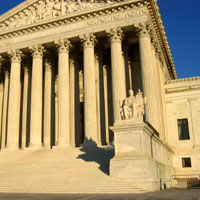SMU experts analyze Supreme Court ruling
on Arizona's tough immigration law
SMU professors discuss Monday's Supreme Court decision on Arizona's tough immigration law.


The three provisions that were struck down would have made it a crime for immigrants without work permits to seek employment, criminalized immigrants who failed to carry registration documents, and would have authorized the police to arrest any immigrant they believed had committed a deportable offense.
SMU experts analyze one of the most-watched Supreme Court decisions of the year:
JOE KOBYLKA
SMU political science professor Joseph F. Kobylka, who was featured prominently in the PBS documentary, “The Supreme Court,” spoke on the court’s unanimous decision to uphold the “stop and check” provision of the law:
“This provision now goes into effect, and will be subject to litigation as to whether, when applied, it violates the federal government’s regulation of immigration matters or the equal protection clause as permitting some kind of ‘racial profiling.’
“Second, Justice Kennedy, who wrote the opinion, and Chief Justice Roberts, who assigned the opinion to Kennedy, broke with their usual judicial bloc (Justices Scalia, Thomas, and Alito) to create the majority (along with Justices Ginsburg, Breyer, and Sotomayor) striking the law.
“Third, this coalition — in its support of broad federal power in the area of immigration — may suggest that a majority of Justices might be more open to sustaining the Affordable Care Act as a regulation of ‘commerce among the states’ than seemed likely after oral arguments,” Kobylka said.
GEORGE MARTINEZ
SMU Dedman School of Law professor George Martinez is an expert on immigration law, the federal courts and legal history. He teaches in the areas of federal courts, complex litigation, civil procedure and jurisprudence. Martinez notes that more constitutional challenges may follow the law’s enforcement:
“The Supreme Court’s decision will be hotly debated, since it upholds the most controversial provision of Arizona’s immigration law (S.B. 1070), one that requires state officers to make a reasonable attempt to determine the immigration status of anyone they stop if reasonable suspicion exists. Critics of the law contend that this permits racial profiling in targeting suspects. The Court decided that it was premature to conclude that this portion of the statute was preempted by federal law, and thus offered a compromise position. The Court wants to give Arizona state courts the opportunity to interpret the statute first and then see if it responds to the decision in constitutional ways. If the state doesn’t, it leaves open possibilities of other constitutional challenges regarding equal protection or racial issues,” Martinez said.
RICK HALPERIN
Rick Halperin is director of the Embrey Human Rights Program within SMU’s Dedman College of Humanities & Sciences. Halperin has twice been board chair for Amnesty International USA and sees immigration reform as a human rights issue:
“A clear message has been sent to Arizona and the other five states that tried to copy Arizona’s S.B. 1070 immigration law: It’s unconstitutional as well as vindictive and inhumane. This a great victory for many in this country who can keep their dignity in the face of harsh lawmakers. We now just need to see if and how Arizona complies with the Supreme Court’s ruling.”
JIM HOLLIFIELD
Jim Hollifield, SMU’s Ora Nixon Arnold Professor of International Political Economy and Director of the John Goodwin Tower Center for Political Studies, said of the court’s decision:
“The Supreme Court, by and large, has upheld the plenary power doctrine whereby the federal government has exclusive authority to make immigration law. The ruling that state and local police can check the immigration status of anyone they stop is intrusive on civil liberties and a nod in the direction of ‘states’ rights,’ but it is consistent with federal law, particularly provision 287g of the 1996 federal immigration law, which allows state and local authorities to enter into agreements with the federal government to enforce federal immigration laws.”
Related Links:
- Politico: Chief Justice John Roberts's big moment
- Huffington Post: Arizona S.B. 1070: Texas Governor Says Decision is ‘One Step Forward and Two Steps Back '
###